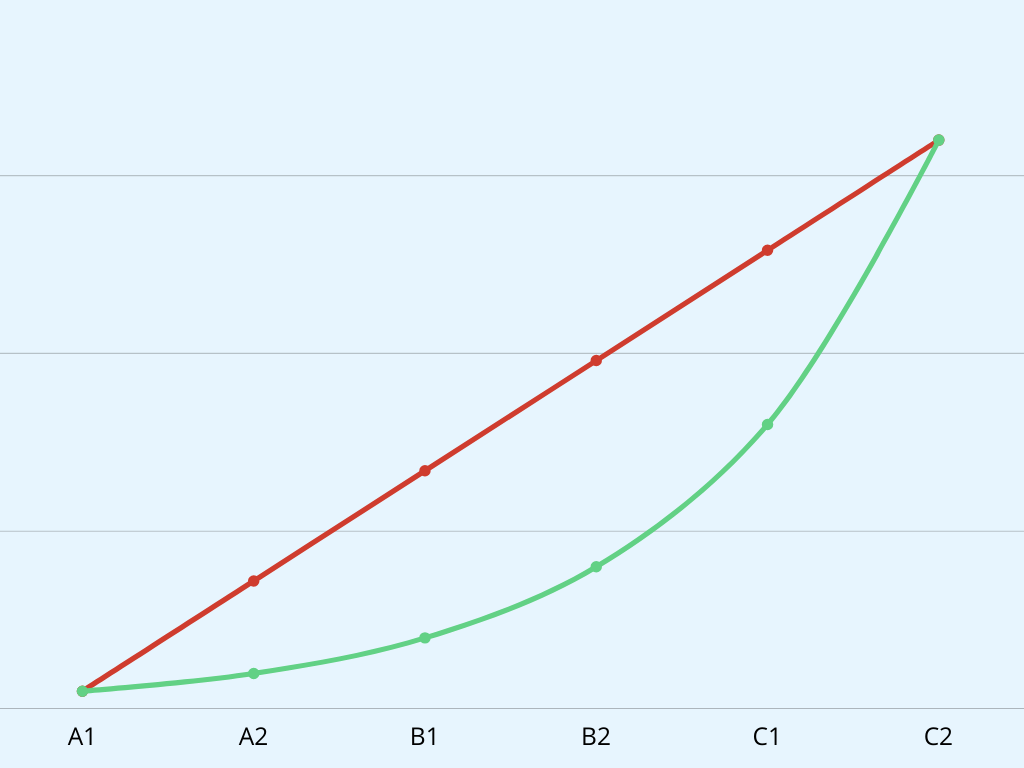
Is the DALF C2 Really that Difficult?
The DALF C2, or Diplôme Approfondi de Langue Française Niveau C2, is the highest achievable credential for French as a foreign language. C2 is the top level of language ability in the CEFR, or Common European Framework of Reference for Languages, after A1, A2, B1, B2, and C1. Whether it’s for personal, academic, or professional reasons, non-native speakers of French can certify their language levels with tests like the TCF, DILF, DELF, and DALF, and only the crème de la crème make it to the C2 level. In the years since passing the DALF C2 exam ourselves in 2019, Maria and I have been asked a great deal of questions about our experience. The most frequently asked question by far is…
How hard is the DALF C2?
While there’s no singular, clear-cut response, we won’t mince words with potential DALF C2 candidates. The DALF C2 is a challenge, and here’s why.
What is my level of French?
The first stumbling block actually has nothing to do with the exam itself. Instead, it’s about advancing to the C2 level at all. Reading, writing, and speaking C2-level French requires virtually bilingual abilities. For this reason, reaching the C2 level in French is a feat that even advanced speakers may never accomplish.
It’s important to understand that passing from one language level to the next isn’t a linear journey, but an exponential one. In essence, moving from the A1 to the A2 level is much easier than going from the C1 level to the C2 level, as reaching each new step on the CEFR scale requires increasingly more time and effort than the last.
Language Acquisition on the CEFR Scale

Expectations
versus
Reality
Taking a closer look at the differences between B2, C1, and C2 will illustrate the fact that the CEFR levels are more distant than they may seem.
According to the Council of Europe’s self-assessment grid, people with B2-level proficiency can understand extended speech and lectures and follow even complex lines of argument provided the topic is reasonably familiar, can read articles and reports concerned with contemporary problems in which the writers adopt particular attitudes or viewpoints, can interact with a degree of fluency and spontaneity that makes regular interaction with native speakers quite possible, and can present clear, detailed descriptions or write clear, detailed text on a wide range of subjects related to their field of interest.
People with C1-level proficiency, by contrast, can understand extended speech and television programmes and films without too much effort, can understand long and complex factual and literary texts, can express themselves fluently and spontaneously without much obvious searching for expressions, can present clear, detailed descriptions of complex subjects, and can express themselves in clear, well-structured text, expressing points of view at some length.
Finally, people with C2-level proficiency have no difficulty in understanding any kind of spoken language, can read with ease virtually all forms of the written language, can take part effortlessly in any conversation, can present a clear, smoothly-flowing description or argument, and can write clear, smoothly-flowing text in an appropriate style.
While it’s obvious that B2, C1, and C2 French users all have an impressive amount of skills, the jump from abilities like “interacting with a degree of fluency” to “taking part effortlessly in any conversation” or “understanding provided the topic is reasonably familiar” to “understanding any kind of spoken language with no difficulty” is quite large.
This reality can cause seasoned learners who are comfortably fluent in French to mistakenly believe that with a bit of studying, they can pass the DALF C2 with no problem. It’s therefore paramount to recognize exactly where you fall on the CEFR scale. Understanding what your level really is will let you either confidently choose the language exam that you know you’ll pass or accurately estimate the work necessary to reach a level that will allow you to take your target language exam in the future.
Which French test should I take?
As it happens, choosing between language exams is the second significant hurdle that candidates face. This time, the exam format itself comes into play. More often than not, candidates considering the DALF C2 are stuck between opting for what they view as the safe option, or the DALF C1, and daring to try the harder option, the DALF C2. Because candidates considering the DALF C2 are generally certain that they can pass the DALF C1, it can be complicated to decide which exam to take. Analyzing the DALF C1 and DALF C2 structures will further illustrate just how tough the C2 really is.
DALF C1 Exam Format
| Listening Comprehension | -Listen twice to a long recording of around eight minutes -Listen once to several short broadcasts -Respond to comprehension questions based on the recordings |
| Reading Comprehension | -Read a literary or journalistic text (1,500 to 2,000 words) -Respond to comprehension questions based on the document |
| Written Skills | -Read several written texts (1,000 words) -Write a summary of the texts -Write an argumentative essay based on the texts |
| Verbal Skills | -Read several written texts -Give a speech about the texts -Discuss texts with examiners |
DALF C2 Exam Format
| Listening Comprehension and Verbal Skills | -Listen twice to a recording -Give an oral summary of the recording -Expand on the issue by adding personal comments about the content presented in the recording -Debate with examiners |
| Reading Comprehension and Written Skills | -Read several written texts (2,000 words) -Write a structured text (article, editorial, report, speech, etc.) based on the texts |
The DALF C1 requires candidates to demonstrate their listening comprehension abilities by listening to recordings and answering written comprehension questions. Moreover, DALF C1 candidates illustrate their verbal skills by reading texts, presenting the information from the texts, and discussing with the examiners. On the other hand, DALF C2 candidates must prove their listening and verbal skills simultaneously by listening to a long recording, summarizing the content aloud, explaining their personal viewpoint, and debating with examiners.
First of all, answering multiple choice and written questions about what you’ve heard (C1) is easier than explaining it and debating it aloud (C2). If you didn’t fully understand the recording, you may be able to guess the correct answer to a multiple choice question, but you likely wouldn’t be able to flesh out an argument during the debate with one of the examiners.
Moreover, given that most language learners find reading comprehension easier than listening comprehension, it’s clear that speaking coherently about what you’ve read (C1) is much simpler than speaking coherently about what you’ve heard (C2). When you’re reading, speed, accent, and pronunciation don’t come into play at all, making it possible to interpret even phrases that you’ve never seen before. If you don’t understand a word or a sentence, you can reread it as many times as necessary. Listening exercises, on the other hand don’t grant the same privileges. If the recording is faster than you can understand or in an unfamiliar accent, there’s nothing you can do about it. Similarly, if you miss a few sentences, you can’t rewind to hear that part again.
Next, notice that the DALF C1 calls for candidates to display their reading skills by reading a text and responding to comprehension questions. DALF C1 candidates reveal their writing skills by reading several texts, writing a summary, and writing an argumentative essay. Contrastingly, DALF C2 candidates must show their reading comprehension and written skills at the same time by reading several documents and then producing their own structured texts.
Answering comprehension questions and writing a summary plus an argumentative essay (C1) requires less technical know-how than writing structured texts like articles, editorials, reports, and speeches (C2). DALF C1 candidates benefit from relatively intuitive essay formats, whereas DALF C2 candidates need to pay special attention to the arrangement of their work.
Additionally, working from written texts of 1,000 words (C1) versus written texts of 2,000 words (C2) is inherently an easier task. The longer the documents, the higher the chance that you’ll come upon content that you don’t understand. DALF C2 candidates must also synthesize a larger amount of information into their composition.
With these comparisons in mind, there’s no doubt that the DALF C2 exam is hard! You’ll need to think critically about whether you’re capable of conquering the DALF C2’s format, or if a lower-level test would be a better choice for you.
Will I pass the DALF C2?
Considering how difficult it is to reach a C2-level of proficiency and the skills required to brave the C2 exam format, it’s not a test that just anyone will pass. Appraising your French-language skills honestly and calculating your exam choice carefully are the prerequisites for landing a C2 diploma.
Though it’s a complex question to answer, Maria and I hope to have given you some insight into just how tough the DALF C2 really is. We have never regretted our choice to perfect our French and pass the exam, and know that our efforts have helped us during our time as teaching assistants with the Teaching Assistant Program in France (TAPIF) and as graduate students in French university. Whether you’re just beginning your language-learning journey or you’re prepping for the DALF C2, we wish you bon courage!
Have you taken a language certification exam? Tell us about your experience in a comment!





3 Comments
Caroline
I’ve been following your site and other content for a while but don’t tend to comment. This has to be an exception. Thank you for creating such a thorough overview of both what to expect and how to prepare! You’ve made my decision on which exam to study for a lot easier. Merci !
Jalen & Maria
Hi, Caroline. Thank you so much for following along with our content, we truly appreciate it! We are delighted that you found this article useful and wish you luck in your language exam endeavors.
Gordon Davies
I’m glad to read your comments on the C2. I passed it as well, but my mark dropped from 86 in C1 to 70 in C2.
In the oral, they must have put more emphasis on the structure of the presentation than on the language because I think I only made one slip of the tongue but I only got 31/50.
That’s OK; I got the certificate, and that’s what counts. I have a slight accent, but when I’m in France people think I live there. I take that as a compliment.
Enjoy your life in France!
Gordon